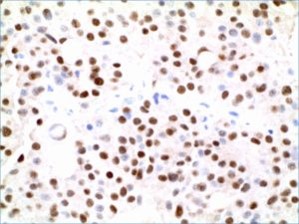
PIT-1 by IHC-12376 - Technical only, 12379 - Technical & interpretation
Test info
PIT-1 by IHC
12376 - Technical only, 12379 - Technical & interpretation
LAB12376
LAB12379
LAB12379
- All IHC stains will include a positive control tissue
- Pit-1 immunostain is useful for diagnosis of the family of pituitary adenomas that display development along the Prolactin-Growth Hormone-TSH spectrum
- It is also present within normal anterior pituitary gland, so the presence of pituitary adenoma must be confirmed on H&E stains (occasionally with the support of ancillary stains such as reticulin stains for normal adenohypophyseal architecture).
Note: Pit-1 should generally be used in conjunction with other pituitary stains to help subtype pituitary adenomas.
Specimen
Tissue
Submit a formalin-fixed, paraffin embedded tissue block
Formalin-fixed, paraffin embedded (FFPE) tissue block
FFPE tissue section mounted on a charged, unstained slide
Ambient (preferred)
- Unlabeled/mislabeled block
- Insufficient tissue
- Slides broken beyond repair
Performance
AHL - Immunohistochemistry
Mo - Fr
1 - 2 days
Immunohistochemical staining and microscopic examination
Clinical and Interpretive info
If requested, an interpretive report will be provided
Specifications
- The PIT-1 gene encodes a transcription factor involved in anterior pituitary development, where it is expressed in cell types responsible for prolactin, growth hormone and beta thyroid stimulating hormone (beta-TSH, also known as beta-thyrotropin) production
- The antibody to the protein Pit-1 reacts with this transcription factor in normal adenohypophysis and in pituitary adenomas, which show development along this line
- Hence, pituitary adenomas that produce prolactin, growth hormone or beta-TSH (or combinations thereof), are expected to be positive using this stain1, 2
Staining pattern
- Strong nuclear staining is observed within lactotrophs, somatotrophs, mammosomatotrophs, thyrotrophs and pituitary adenomas that develop along these lines of differentiation
References:
- Friend KE, Chiou YK, Laws ER, Jr., Lopes MB, Shupnik MA. Pit-1 messenger ribonucleic acid is differentially expressed in human pituitary adenomas. J Clin Endocrinol Metab. 1993;77(5):1281-6.
- Pellegrini I, Barlier A, Gunz G, Figarella-Branger D, Enjalbert A, Grisoli F, et al. Pit-1 gene expression in the human pituitary and pituitary adenomas. J Clin Endocrinol Metab. 1994;79(1):189-96.
Billing
88342 - 1st stain
88341 - each additional stain
88341 - each additional stain
Tracking
08/07/2017
10/19/2018
01/12/2024
